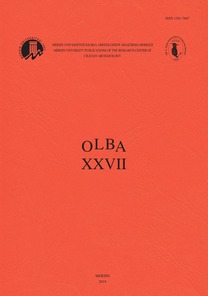KELENDERİS’TE BULUNAN BİR GRUP ROMA DÖNEMİ
TİCARİ AMPHORASI VE DÜŞÜNDÜRDÜKLERİ
Bu çalışmanın amacı Batı ve Doğu Akdeniz Dünyası arasındaki ticaretin tarihi ile ilgili ticari amphoraların birçok çeşidinin gün yüzüne çıkarıldığı Orta Dağlık Kilikya kıyılarının en eski yerleşimlerinden Kelenderis’te yapılan kazılarda ortaya çıkarılan Roma Dönemi’ne ait materyalin bir grubunu oluşturan taşıma vazolarını tartışmaktır. Kelenderis Aşağı Şehir Sondajı, Liman Hamamı ve Batı Nekropolü’ndeki bir mezarda 5 farklı tipe ait ticari amphora tespit edilmiştir. Malzemenin büyük çoğunluğu Aşağı Şehir Sondajında ele geçmiştir. Bu vazoların en erken örneği kabaca M.S. 1. yüzyıla tarihlenen Geç Helenistik - Erken Roma tipindeki Rodos Amphorası’dır. Diğer ticari amphora örnekleri ise Orta ve Geç Roma Dönemi’ne aittir. “Pinched Handle” yada Zemer 41 adıyla bilinen amphoralar oldukça geniş bir bölgede kullanım görmüş olup M.S. 2. yy’da üretilmeye başlamış ve M.S. 4. yy’ın sonuna kadar kullanılmıştır. Bu tipi takiben, Kelenderis’te çok büyük miktarda M.S. 5. ve 7. yüzyıllar arasında Doğu Akdeniz’de yaygın olarak kullanım görmüş olan LR 1 tipine rastlanır. Üçüncü tip M.S. 6. ve 7. yüzyılda tipik Sinop üretimi olduğuna inanılan “Havuç Formlu” amphoralardır. Son tip olan Keay Tip 52 ise Kelenderis’te şimdiye kadar bulunan ticari amphoralar arasında en az örneğe sahip olan gruptur. Burada belirtilen tiplere bağlı olarak, Kelenderis’te ticari hareketlenmenin Erken Roma İmparatorluk Dönemi’nde başlayarak M.S. 7. yüzyıla kadar artarak devam etmiş ve böylelikle Kelenderis Doğu Akdeniz coğrafyasındaki en önemli liman kentlerinden birisi olmuştur. Bu durum, aynı zamanda, son yıllardaki kazıların gösterdiği gibi, kentin imarıyla (Bauprogramm) ilgili verilerle de ortaya konmuş olup Kelenderis’in Romalılaşma süreciyle de bağlantılıdır
A Group of Roman Transport Amphorae from Kelenderis and
Some Thoughts on Them
Kelenderis is one of the oldest settlements on the coast of Central Rough Cilicia, where various types of transport amphorae have been unearthed. Concerning its long history of commerce between the Eastern and Western Mediterranean World the aim of this paper is primarily to introduce and discuss a group of transport vases from the Roman Period. Five different types were recognized, found in various parts of the ancient settlement area, especially in the Lower City Trench, in the excavation of the Harbor Bath and in a tomb in the West Necropolis. The earliest example of these vases is a Rhodian Amphora of later Hellenistic and Early Roman type which may be dated roughly to the 1st century A.D. The rest of the transport vases are from the Middle and Later Roman Period. The so called “Pinched Handle” Amphora or Zemer 41 is a widespread container which may have been started to be produced in the second century A.D. and was in use up to the end of the fourth century A.D. A great amount of the forms found in Kelenderis is the type of LR 1 which is common in the Eastern Mediterranean between the 5th to the 7th century A.D. The third type is the ‘Carrot-shaped’ amphorae, which is believed to be a typical production of Sinope in the 6th and 7th centuries A.D. And lastly the type of the Keay Type 52 which is the weakest group of transport amphorae found in Kelenderis till now. Related to these types mentioned, it may be proposed that commercial activities in Kelenderis started in the beginning of the Early Roman Imperial Period and went on increasingly up to the 7th century A.D. Kelenderis seems to be one of the important harbor towns in the Eastern Mediterranean. This situation may be also connected with the Romanization of the town, which was revealed by the Bauprogramm in the town, as the excavations in recent years have shown
